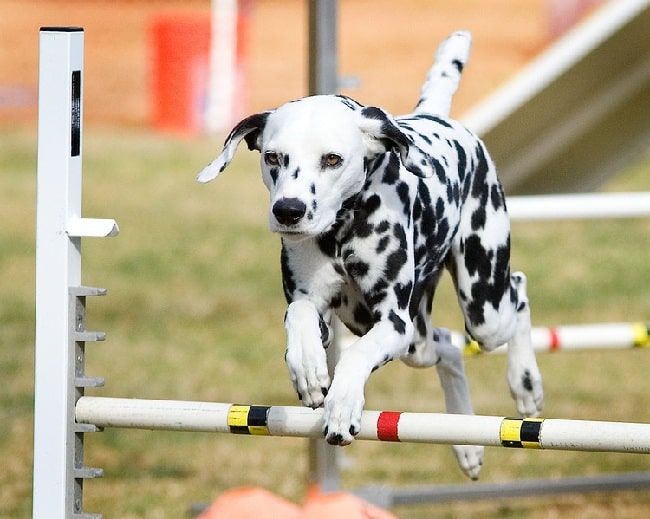Dalmatians, with their striking coats and lively personalities, have captured the hearts of many dog enthusiasts worldwide. If you're considering adopting a Dalmatian or already have one at home, understanding their behavior is crucial for fostering a harmonious relationship. These dogs are known for their energy, loyalty, and intelligence, but they also come with specific quirks that require patience and dedication. In this article, we'll delve into the nuances of Dalmatian behavior, offering actionable advice for training, socialization, and addressing common challenges. Whether you're a seasoned dog owner or a newcomer, this guide will help you navigate the world of Dalmatians with confidence and compassion.
As one of the most recognizable breeds, Dalmatians are more than just their iconic spots. Their behavior reflects their rich history as coach dogs, guardians, and companions. Known for their high energy levels, these dogs thrive in active households where they can burn off steam through exercise and play. However, without proper guidance, Dalmatian behavior can sometimes become challenging. From barking to jumping, and even stubbornness, these traits can test even the most patient owner. By understanding the root causes of these behaviors, you can implement effective strategies to ensure a well-behaved and happy Dalmatian.
Our focus in this article is to provide you with practical insights into Dalmatian behavior, supported by expert advice and real-life examples. We'll explore the importance of early socialization, the role of training in shaping behavior, and how to address common issues such as separation anxiety and aggression. Additionally, we'll highlight the importance of exercise and mental stimulation in maintaining a balanced Dalmatian. By the end of this article, you'll have a comprehensive understanding of Dalmatian behavior and the tools needed to create a positive environment for your furry friend.
Read also:Vedic Chart Interpretation Unlocking The Secrets Of Your Destiny
Table of Contents
- Why is Understanding Dalmatian Behavior Important?
- What Are the Common Traits of Dalmatian Behavior?
- How Does Early Socialization Impact Dalmatian Behavior?
- Is Training Essential for Managing Dalmatian Behavior?
- Addressing Separation Anxiety in Dalmatians
- Dealing with Aggression: A Dalmatian Behavior Concern
- Exercise and Mental Stimulation: Keys to Balanced Dalmatian Behavior
- How to Handle Barking and Jumping in Dalmatians?
- What Are Some Unique Aspects of Dalmatian Behavior?
- Final Thoughts on Nurturing Positive Dalmatian Behavior
Why is Understanding Dalmatian Behavior Important?
Understanding Dalmatian behavior is more than just a matter of convenience; it's about building a strong bond with your pet. These dogs are not only intelligent but also highly sensitive to their environment. A lack of understanding can lead to frustration on both sides, resulting in behavioral issues that could have been avoided. By recognizing the underlying causes of Dalmatian behavior, you can tailor your approach to meet their needs effectively. For instance, their high energy levels require consistent physical activity, while their intelligence demands mental challenges to prevent boredom.
What Are the Common Traits of Dalmatian Behavior?
Dalmatians are known for several common traits that define their behavior. They are energetic, playful, and incredibly loyal. However, these traits can manifest in ways that may seem challenging if not properly managed. For example, their playfulness can sometimes lead to destructive behavior if they don't receive enough attention or exercise. Additionally, their loyalty can make them protective, which might translate into aggression if they feel their family is threatened. Understanding these traits is the first step in addressing potential issues and fostering a well-behaved Dalmatian.
How Does Early Socialization Impact Dalmatian Behavior?
Early socialization plays a crucial role in shaping Dalmatian behavior. Exposing your Dalmatian puppy to various environments, people, and other animals from a young age helps them develop confidence and adaptability. This process is vital in preventing fear-based aggression and other behavioral issues later in life. Socialization also enhances their ability to interact positively with strangers and other pets, making them more sociable and less anxious in new situations. By prioritizing early socialization, you lay the foundation for a well-adjusted Dalmatian.
Is Training Essential for Managing Dalmatian Behavior?
Training is absolutely essential for managing Dalmatian behavior. These dogs are intelligent and quick learners, but they also have a stubborn streak that requires consistent and positive reinforcement. Training not only teaches them basic commands but also helps in addressing specific behavioral issues. For instance, teaching your Dalmatian to sit and stay can prevent jumping on guests, while leash training can make walks more enjoyable for both you and your pet. Incorporating training into your routine ensures that your Dalmatian remains obedient and well-mannered.
Addressing Separation Anxiety in Dalmatians
Separation anxiety is a common issue among Dalmatians, as they form strong bonds with their families. This anxiety can manifest in destructive behavior, excessive barking, or even self-harm when left alone. To address this, it's important to gradually acclimate your Dalmatian to being alone by starting with short periods of separation and gradually increasing the time. Providing them with interactive toys or puzzles can also help keep them occupied and reduce anxiety. Additionally, maintaining a consistent routine can provide a sense of security for your Dalmatian.
Dealing with Aggression: A Dalmatian Behavior Concern
Aggression in Dalmatians can stem from several factors, including fear, territoriality, or lack of socialization. It's important to identify the root cause of the aggression to address it effectively. In many cases, professional training or behavioral therapy may be necessary to help your Dalmatian overcome these issues. Positive reinforcement techniques, such as rewarding calm behavior, can also be effective in modifying aggressive tendencies. Remember, patience and consistency are key when dealing with aggression in Dalmatians.
Read also:Understanding Link Katrina A Comprehensive Guide To Its Impact And Importance
Exercise and Mental Stimulation: Keys to Balanced Dalmatian Behavior
Exercise and mental stimulation are vital for maintaining balanced Dalmatian behavior. These dogs require at least one to two hours of physical activity daily to burn off their excess energy. Activities such as running, hiking, or playing fetch are excellent ways to keep them physically fit. Mental stimulation is equally important, and you can achieve this through puzzle toys, obedience training, or even teaching them new tricks. A tired Dalmatian is a well-behaved Dalmatian, so ensuring they receive adequate exercise and mental challenges is essential for their overall well-being.
How to Handle Barking and Jumping in Dalmatians?
Barking and jumping are common behaviors in Dalmatians, often stemming from excitement or a need for attention. To handle excessive barking, it's important to identify the triggers and address them accordingly. For example, if your Dalmatian barks at strangers, desensitization techniques can help reduce this behavior. Similarly, jumping can be managed through consistent training and rewarding calm behavior. Teaching your Dalmatian an alternative action, such as sitting, can redirect their energy in a positive way. With patience and persistence, you can effectively manage these behaviors and create a more peaceful home environment.
What Are Some Unique Aspects of Dalmatian Behavior?
Beyond their common traits, Dalmatians exhibit several unique aspects of behavior that set them apart from other breeds. For instance, their strong protective instincts make them excellent watchdogs, but this can sometimes lead to overprotectiveness. Additionally, their sensitivity to changes in their environment means they may react strongly to new situations or people. Understanding these unique aspects of Dalmatian behavior allows you to anticipate and address potential challenges, ensuring a harmonious relationship with your pet.
Final Thoughts on Nurturing Positive Dalmatian Behavior
Nurturing positive Dalmatian behavior requires a combination of patience, consistency, and understanding. By recognizing the importance of socialization, training, and exercise, you can create an environment that supports your Dalmatian's needs and promotes good behavior. Remember, every Dalmatian is unique, and what works for one may not work for another. Stay attentive to your pet's individual personality and adjust your approach accordingly. With the right strategies and a loving attitude, you can foster a strong bond with your Dalmatian and enjoy a rewarding companionship for years to come.
In conclusion, understanding Dalmatian behavior is essential for every owner. By addressing common challenges and nurturing positive traits, you can ensure a well-behaved and happy Dalmatian. Whether it's through early socialization, consistent training, or providing adequate exercise, the key lies in meeting their needs and building a strong foundation of trust. Embrace the journey of owning a Dalmatian, and you'll discover the joys of having a loyal and loving companion by your side.


